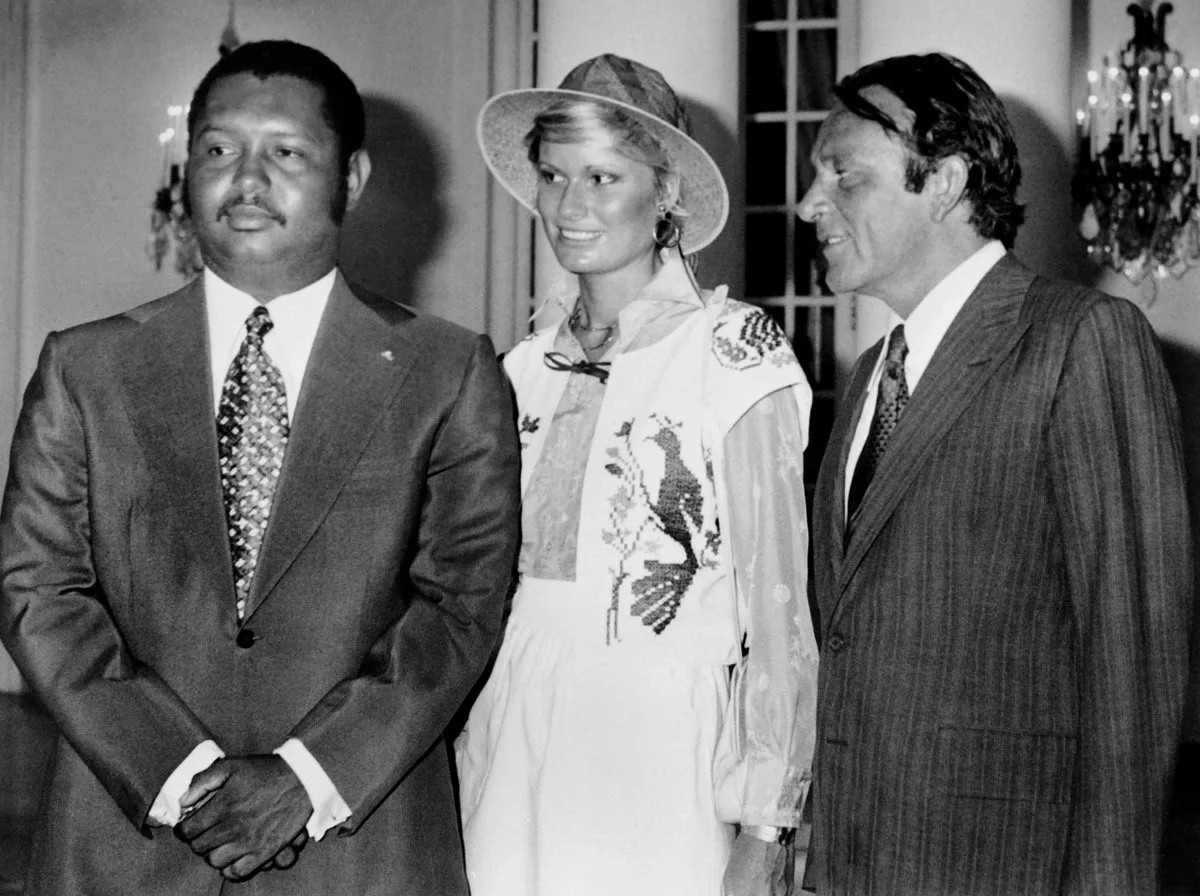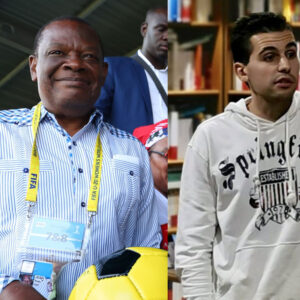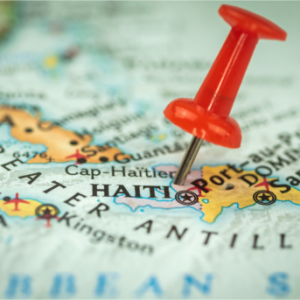There was a time when Haiti was a favored destination for the rich and famous. Richard and Elizabeth Taylor spent their honeymoon there. Noel Coward, John Gielgud, Paulette Goddard and Irving Berlin also visited the country. Mick Jagger and presenter Barbara Walters are part of a later generation of celebrities.
The names of celebrities appear in the guestbook of the Grand Hôtel Oloffson in the capital, Port-au-Prince. Graham Greene stayed there while writing The Comedians, which brought the Haiti of Papa Doc Duvalier and his bloodthirsty secret police, Tonton Macoute, to more English-speaking readers.
The shift, which began with Duvalier’s repressive regime, which sought to terrorize its subjects by identifying with Baron Samedi, the Vodou god of the dead, was never reversed. Papa Doc died in 1971 and his 19-year-old son, Jean Claude “Baby Doc” Duvalier, succeeded him. The descent into chaos continued.
Today, Haiti is essentially a failed state, where criminal gangs control more than 80% of Port-au-Prince. According to the United Nations, around 4,450 people have been killed in the past year, including 1,500 in the last three months. In addition, 1,700 people were injured. The UN High Commissioner for Human Rights, Volker Turk, has warned that “scandalous” levels of violence have brought Haiti “to the brink of collapse”.
Among the wealthy Haitians who have not yet left the country, many have holed up in recent weeks in their homes in Pétionville, on the hill overlooking the capital, listening to the echoes of gunshots and watching the flames spread as violence consumes the capital.
The gangs turned their glare up the hill, toward the plush suburb of mansions, embassies and hotels that, until now, had managed to avoid the worst of the war. Groups of young men arrived on motorbikes and stolen cars, brandishing automatic rifles and machetes, intending to loot and kill.
A bank, shops, cafes, gas stations and a number of houses were looted in Pétion-Ville and the neighboring districts of Laboule and Thomassin. But many residents had armed themselves, along with the security guards they employ, in anticipation of an attack. An increasingly active anti-gang vigilante group, Bwa Kale, arrived to join the fight.
Around twenty people were killed in the clashes that followed. Furious residents burned and mutilated bodies, cutting off the hands of some looters. Two gang leaders were killed consecutively: Makandal, then Ernst Julme, alias Ti Greg, leader of Delmas 95, who was getting closer to a coalition of gangs led by Jimmy “Barbecue” Chérizier, the best-known Haitian mafioso.
Police said they shot Julme. Bwa Kale vigilantes are said to have killed Makandal. The gangs have vowed revenge: but their attempts to take over the areas they already control have been thwarted so far.
Haitians have the overwhelming feeling of being abandoned to their sad fate. It has been six months since the United Nations, with the support of Washington, approved the sending of a military support mission. Over the past three months, neighboring Caribbean and Latin American states have issued warnings that Haiti was on the verge of collapse.
A transitional council is expected to be formed in the coming days to set up an administration until elections are held later this year. António Guterres, the secretary-general of the United Nations, welcomed the news and said he hoped it would pave the way for a more stable future.
But the general feeling is that the transitional council will not be able to do much for now. People continue to vote with their feet. The United States is evacuating its nationals by helicopter from Port-au-Prince to the Dominican Republic, which forms the island of Hispaniola with Haiti. The Port-au-Prince airport suspended its activities after being attacked several times by armed men.
The French government announced this week that it would remove 170 of its nationals and 70 others from European Union states due to the continued deterioration of security. Like the American operation, the evacuation took place by helicopter.
The last president, Jovenel Moïse, was assassinated in 2021, approximately five months after the end of his legal and constitutional mandate. The de facto prime minister who succeeded him, Claude Joseph, was later indicted for Moïse’s assassination. Then came Ariel Henry, adored by the international community despite his numerous excesses and denunciations of collusion with armed terrorist bands. Meanwhile, Haiti has degenerated into an uncontrolled and chaotic space. “Lost territories” have emerged.
The Haitian army, once the architect of presidents, was dissolved by the previous president, Jean-Bertrand Aristide. The only current security presence is a beleaguered police force struggling to protect what remains of the national institutions. This week, they barely managed to repel an attempted attack on the country’s central bank. A mob of armed gangs managed to storm the two main prisons in late February, allowing 4,400 inmates serving sentences for violent crimes – including murder, rape and robbery – to take to the streets. Ernst Julme, who died this week, was one of the released prisoners.
The growing anarchy was described by the head of Unicef in Haiti, Catherine Russell, as a “Mad Max scene”. The convocation of Catholic bishops in Port-au-Prince lamented that the country was “reduced to rubble and ashes” and that “moral codes are collapsing.”
Rival criminal groups share territories. There are no fewer than 200 gangs in the country, including around a hundred in Port-au-Prince alone. Many of them have historical ties to successive politicians and regimes, allowing them to recruit and build arsenals with impunity.
The police complain of being overwhelmed by the gangs. Garry Jean Baptiste, a national police union official, says successes have been achieved despite a lack of national and international aid.
“We’re taking down some key criminals, the leaders – that’s a good message for the gangs. But they have a lot of weapons. We don’t have enough guns or equipment – 60% of police officers don’t even have body armor. Many of our members have been killed, and these are police officers risking their lives for only $200 a month.”
Calls for intervention are increasing in the United States. James Foley, former US ambassador to Haiti, stresses that if urgent action is not taken, the United States will face a failed state run by criminals and drug traffickers approximately 700 miles from Florida. Setting up a Transitional Council “is a race against time – and, in my view, is unlikely to succeed, or even allow international security forces into the country , without American military cover.
For Jean-Philippe, life in Haiti is “like in Mogadishu”. Gang leaders, he says, are “like warlords – they want money and power.” The formation of the transition council is a step in the right direction. But “people are wondering where their army is.”
The earthquake, the “day of disaster”, left more than 220,000 dead, destroyed more than a quarter of a million homes and 30,000 commercial and industrial buildings. The poorest country in the Western Hemisphere, whose history is punctuated by natural and human disasters, brutal repression and endemic corruption, was in shock at what had happened to it.
Elections later that year seemed to offer a firm path forward. Justice for past human rights violations was to be served with the trial of Jean-Claude Duvalier, who had returned to Haiti – but died before being tried.
Michel Martelly was brought to power by a fraudulent and managed ballot. A professional musician with saucy songs, dividing his time between Miami and Haiti, he entertained journalists during the campaign with renditions of Konpa Creole music, and promised to eradicate corruption and integrate Haiti into the international community. However, he revealed himself to be the king of corruption and one of the main squanderers of Petro Caribe funds.
But hopes for a post-earthquake revival of the nation quickly faded. Most of the billions of dollars in promised foreign aid have not materialized. Much of what happened was misused.
It didn’t take long for old Haitian politics to resurface. Martelly had to step down in 2016 amid allegations of electoral fraud without having found a successor. He was later sanctioned by the Canadian government for human rights violations and involvement in criminal gangs. The elections organized at the end of the year brought Jovenel Moise to the presidency, according to the choice previously established by the real holders of power in Haiti.
The justice system is collapsing. Kidnappings increased by 72% last year compared to the previous year. It is not only the rich who are kidnapped and ransomed, but also doctors, lawyers, academics. Many victims are regularly murdered if the ransom is not paid.
Many Haitians today believe that salvation lies in international – preferably Western – intervention.
But foreign powers have left scars throughout the country’s two centuries of history. Haiti gained its independence through a slave revolt that began in 1804 in what was then the French colony of Saint-Domingue, fighting not only French forces, but also those of Great Britain and the Spain.
The French isolated Haiti from the international community, demanding 150 million francs ($21 billion in today’s dollars) in reparations to lift the blockade. After negotiations, the penalty was reduced to 90 million francs, but in 1914, no less than 80% of Haiti’s budget was still devoted to paying the debt.
That same year, 1914, U.S. marines landed in Port-au-Prince and withdrew $500,000 in gold ($15 million in today’s money) from the National Bank of Haiti to protect the investments of Wall’s financiers. Street. American forces returned a year later for two decades of occupation. “I helped make Haiti a decent place for the National City Bank boys to earn income,” said the U.S. commander, Maj. Gen. Smedley Butler.
Even the benevolent deployment of a United Nations force after the 2010 earthquake created misery. Infected sewage from their base led to the deaths of 10,000 people in Haiti, then spared from cholera.
But in the current situation, many Haitians must nt look to the future, not the past. Jean Daniel Delone, an excellent journalist I worked with in Haiti, was full of hope that the country would recover and move forward after the calamities it experienced. Today, he says, it is time to face reality.
“We are in a precarious situation. We are short of water and food, and we desperately need humanitarian aid,” he said. “We live near places where gangs are rampant all the time. We hear the shots clearly; we will have big problems if they settle in, because supplies can no longer come from the areas they have taken.
source: The Independent







